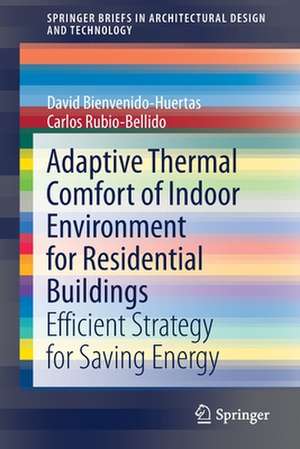Adaptive Thermal Comfort of Indoor Environment for Residential Buildings: Efficient Strategy for Saving Energy: SpringerBriefs in Architectural Design and Technology
Autor David Bienvenido-Huertas, Carlos Rubio-Bellidoen Limba Engleză Paperback – apr 2021
Din seria SpringerBriefs in Architectural Design and Technology
-
 Preț: 377.18 lei
Preț: 377.18 lei -
 Preț: 378.12 lei
Preț: 378.12 lei -
 Preț: 377.95 lei
Preț: 377.95 lei -
 Preț: 378.04 lei
Preț: 378.04 lei -
 Preț: 416.54 lei
Preț: 416.54 lei -
 Preț: 377.73 lei
Preț: 377.73 lei -
 Preț: 413.15 lei
Preț: 413.15 lei -
 Preț: 376.22 lei
Preț: 376.22 lei -
 Preț: 479.29 lei
Preț: 479.29 lei -
 Preț: 443.58 lei
Preț: 443.58 lei - 15%
 Preț: 464.32 lei
Preț: 464.32 lei -
 Preț: 375.07 lei
Preț: 375.07 lei -
 Preț: 257.07 lei
Preț: 257.07 lei -
 Preț: 258.45 lei
Preț: 258.45 lei
Preț: 461.16 lei
Preț vechi: 542.54 lei
-15% Nou
Puncte Express: 692
Preț estimativ în valută:
88.26€ • 91.79$ • 73.86£
88.26€ • 91.79$ • 73.86£
Carte tipărită la comandă
Livrare economică 14-28 martie
Preluare comenzi: 021 569.72.76
Specificații
ISBN-13: 9789811609053
ISBN-10: 9811609055
Pagini: 75
Ilustrații: VI, 75 p. 41 illus., 37 illus. in color.
Dimensiuni: 155 x 235 mm
Greutate: 0.14 kg
Ediția:1st ed. 2021
Editura: Springer Nature Singapore
Colecția Springer
Seria SpringerBriefs in Architectural Design and Technology
Locul publicării:Singapore, Singapore
ISBN-10: 9811609055
Pagini: 75
Ilustrații: VI, 75 p. 41 illus., 37 illus. in color.
Dimensiuni: 155 x 235 mm
Greutate: 0.14 kg
Ediția:1st ed. 2021
Editura: Springer Nature Singapore
Colecția Springer
Seria SpringerBriefs in Architectural Design and Technology
Locul publicării:Singapore, Singapore
Cuprins
1. Building Energy Efficiency and Sustainability.- 2. Adaptive Thermal Comfort Models for Buildings.- 3. Application of Adaptive Thermal Comfort Models for Energy Saving in Buildings.- 4. Energy Savings Obtained with an Adaptive Approach.- 5. Decision Making to Apply Adaptive Approaches.
Notă biografică
David Bienvenido-Huertas is researcher in the Department of Building Construction II at the Universidad de Sevilla. He is Visiting Professor at the University of Seville and the University of La Coruña. His area of expertise covers climate change in the building sector, adaptive thermal comfort, heat transfer, fuel poverty, energy conservation measures, and design of nearly zero energy buildings. He is an author of more than 50 research papers and he is a recognized reviewer of various international indexed journals.
Carlos Rubio-Bellido is a Professor in the Department of Building Construction II at the University of Seville. His research is focused on energy efficiency in the building sector as well as building performance simulation. He is a Visiting Professor at Bío-Bío University (Chile). He is a member of the International Scientific Committee of various international conferences. He is the author of more than 50 research papers. He is a recognized reviewer of various international indexed journals and international research projects.
Carlos Rubio-Bellido is a Professor in the Department of Building Construction II at the University of Seville. His research is focused on energy efficiency in the building sector as well as building performance simulation. He is a Visiting Professor at Bío-Bío University (Chile). He is a member of the International Scientific Committee of various international conferences. He is the author of more than 50 research papers. He is a recognized reviewer of various international indexed journals and international research projects.
Caracteristici
Analyzes the sustainability objectives established for the building stock and the importance of thermal comfort Presents existing adaptive thermal comfort models and the main energy-saving measures Includes case studies to emphasize/substantiate the thermal comfort models
